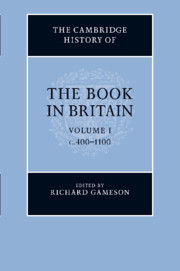Book contents
- Frontmatter
- 1 From Vindolanda to Domesday: the book in Britain from the Romans to the Normans
- PART I THE MAKING OF BOOKS
- PART II THE CIRCULATION OF BOOKS
- PART III TYPES OF BOOKS AND THEIR USES
- 15 The book in Roman Britain
- 16 The use of the book in Wales, c. 400–1100
- 17 The biblical manuscripts of Anglo-Saxon England
- 18 Anglo-Saxon gospel-books, c. 900–1066
- 19 Liturgical books
- 20 Anglo-Saxon prayerbooks
- 21 Psalters
- 22 Music books
- 23 Anglo-Saxon schoolbooks
- 24 Law books
- 25 Manuscripts of the Anglo-Saxon Chronicle
- 26 Old English homiliaries and poetic manuscripts
- PART IV COLLECTIONS OF BOOKS
- PART V CODA
- Bibliography
- Concordance of named manuscripts
- Index of manuscripts
- General Index
- Plate 4.1: The Lindisfarne Gospels"
- Plate 5.1: The Lichfield/St Chad Gospels"
19 - Liturgical books
from PART III - TYPES OF BOOKS AND THEIR USES
Published online by Cambridge University Press: 28 March 2012
- Frontmatter
- 1 From Vindolanda to Domesday: the book in Britain from the Romans to the Normans
- PART I THE MAKING OF BOOKS
- PART II THE CIRCULATION OF BOOKS
- PART III TYPES OF BOOKS AND THEIR USES
- 15 The book in Roman Britain
- 16 The use of the book in Wales, c. 400–1100
- 17 The biblical manuscripts of Anglo-Saxon England
- 18 Anglo-Saxon gospel-books, c. 900–1066
- 19 Liturgical books
- 20 Anglo-Saxon prayerbooks
- 21 Psalters
- 22 Music books
- 23 Anglo-Saxon schoolbooks
- 24 Law books
- 25 Manuscripts of the Anglo-Saxon Chronicle
- 26 Old English homiliaries and poetic manuscripts
- PART IV COLLECTIONS OF BOOKS
- PART V CODA
- Bibliography
- Concordance of named manuscripts
- Index of manuscripts
- General Index
- Plate 4.1: The Lindisfarne Gospels"
- Plate 5.1: The Lichfield/St Chad Gospels"
Summary
To speak meaningfully of the function of liturgical books in England before ad 1100 requires first a simple distinction between their use as resources for the performance of liturgies and their character as books. Certain Christian liturgies can be conducted without the aid of books, either because they have been committed entirely to memory or because they are improvisatory in nature. Examples of the former would be emergency baptisms, confirmations and the office of compline, while some kinds of blessings (like that of foxhounds in modern times), intercessions for particular new necessities – incursions of Vikings or, later and in eastern Europe, Mongols – and, in the very earliest period, perhaps even the eucharistic prayer, may well have been largely extemporaneous in character.
At the other pole of this basic distinction, the existence of a ‘liturgical book’ – to be precise, a book that falls more sensibly into the liturgical category than into any other – does not guarantee that it was used liturgically. Sumptuously produced gospel-books are an obvious case here, and indeed loom large throughout our period. But it would be unwarranted to suppose that the liturgical gospel at mass was regularly read from, say, either of two famous gospel-books in earliest England, the Lindisfarne Gospels or the Codex Aureus. So those, and other celebrated books of the same sort, will be treated, largely with respect to their decoration and illumination, in other chapters of the present volume. Similarly with psalters: it certainly cannot be proved, and cannot reasonably be assumed, that the sorts of splendid psalters which acquire art-historical nicknames were employed in the actual performance of the daily office.
Keywords
- Type
- Chapter
- Information
- The Cambridge History of the Book in Britain , pp. 449 - 459Publisher: Cambridge University PressPrint publication year: 2011

